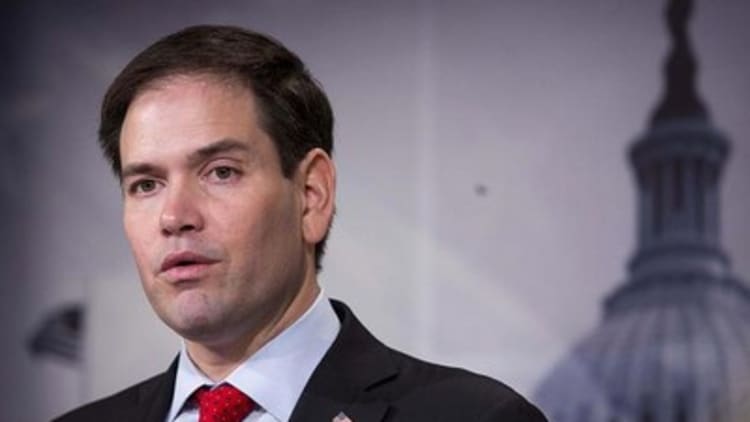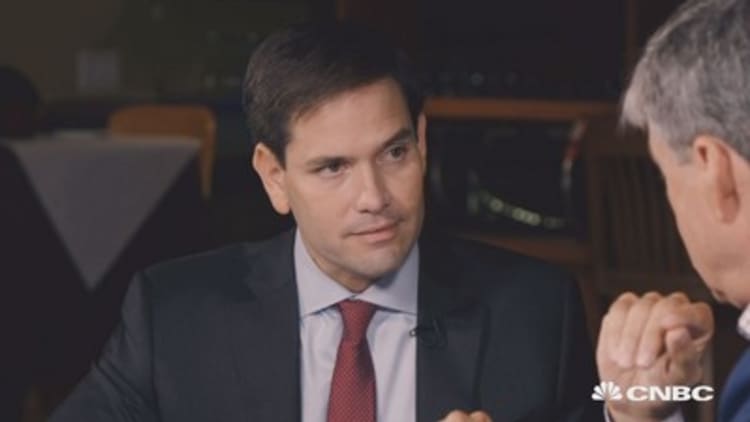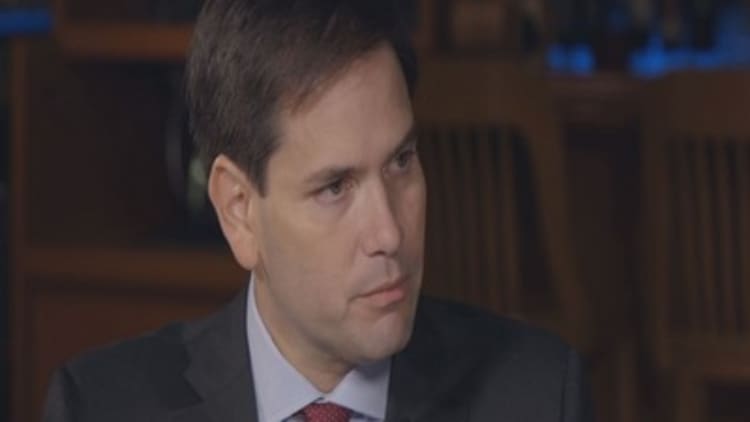



If Republican voters were to select their 2016 presidential nominee on raw talent alone, they would surely anoint Marco Rubio of Florida. As football scouts put it, the Cuban-American senator is the complete package.
Spanish speaker at a time when Republicans desperately need Latino votes? Check.
Fluid, hopeful communicator for a party lacking Reaganesque optimism? Check.
Risk-taking conservative who has proposed a sweeping tax overhaul plan in the name of 21st century economic transformation? Check.
Handsome, vigorous campaigner with star quality? Check. (The one-time high school standout says he was as fast on the football field as NFL all-star Wes Welker).
But, of course, the Republican contest—currently dominated by the bombast of Donald Trump—is more complicated than that.
Nationally, Rubio trails Trump as well as former Florida Gov. Jeb Bush and retired brain surgeon Ben Carson. The most recent survey in New Hampshire showed him tied for seventh place.
One challenge is his youth (he's 44) and status as a first-term senator, just as Barack Obama was in 2008. Many Republicans don't savor the parallel.
"I hear people say that," Rubio said in an interview at a Cuban restaurant in Detroit. "But the first thing is, I have achieved things before I even got into the U.S. Senate. I was the (House) speaker of the third-largest and most-diverse state in the country.
"I don't think Barack Obama failed because he was a senator, or because he hadn't been in the Senate long enough. I think he has failed because his ideas don't work."
Rubio has also faced unease among conservatives for his role in forging a bipartisan compromise on comprehensive immigration reform in 2013. Since it died in the House, the Republican immigration debate has shifted even further to the right.
"Here's the bottom line," he said. "We cannot pass a comprehensive bill. It doesn't have enough support among the population, and it doesn't have enough votes in Congress.
"How can we achieve reforms in a way that has a chance of becoming law?" he added. "Step one has to be to prove to people illegal immigration is under control.... Step two would then be modernizing our legal immigration system so that it's merit-based.... After you've done those things, I honestly believe we will be able to reasonably deal with those who are here illegally now."
His campaign's policy emphasis begins with his tax overhaul plan. It has drawn criticism from left and right alike on several grounds. It was not designed to be "revenue-neutral," which means it expands the federal budget deficit during the first 10 years. Its reduction in the top personal income tax rate, to 35 percent from the current 39.6 percent, is not large enough for some economic conservatives. Neither do they favor its large increase in child tax credits, which they say does nothing to spur economic growth.
"The growth happens on the business side," Rubio responded. He was referred to the plan's elimination of taxes on capital gains and dividends, its cut in the top corporate tax rate to 25 percent from 35 percent, and its provision for immediate tax deductions for business investment.
As for the child tax credits, he added, "You want to strengthen America? Strengthen families. Help families with the cost of daily living. People that are raising children are making an extraordinary investment in America's future. Those are our future taxpayers they're raising. Those are the people that are going to sustain Medicare and Social Security."
An unabashed social conservative, Rubio rejects the charge from Democrats that the candidate who talks of future-oriented economic policies looks in the opposite direction on issues such as abortion. He wants to outlaw it. Fetal-tissue research using tissue from abortions, he said, is immoral and wrong even though scientists credit it with important medical advances.
"The fact that that exists creates the industry that Planned Parenthood has now entered into," he said. "Just yesterday we see a video where a child whose heart was still beating had his brain removed. This is an outrage. It's grotesque. And American taxpayers are paying for it."
Rubio's strong performance in the first Republican presidential debate earlier this month sparked predictions that he would climb in the polls. The debate had a huge television audience.
So far, there's little evidence he has gotten a big boost.
"I'm not a political analyst. I'm a candidate," he said when asked about the aftermath. "We don't really pay attention to polls, especially in August when the election is this far ahead.
"This is all I can do: I'm going to go out, work as hard as I possibly can to deliver people my message about what I want to do if I'm elected president.... And then ultimately voters are going to make a choice when their moment comes."




